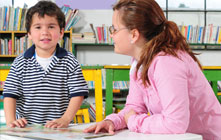10 Ways to Work Learning Into Your Next Trip to the Grocery Store
Can a simple trip to the supermarket be a learning experience for your child? Sure, if you know how. You incorporate reading and math, for instance, every time you shop; there's no reason why you can't involve your child in these activities and more. Here's how a quick trip to the grocery store can be an education for your child.

 |
1. Vocabulary Lessons
Go over the words you're likely using throughout the store, such as 'aisle,' 'produce,' 'label,' 'bakery' and 'dairy.' Have your child sound them out and spell them. Introduce them to words they may not be familiar with, such as 'avocado,' 'asparagus' or 'pistachio.'
2. Reading Opportunities
Have your child hold on to the grocery list and identify whatever items they can. As you shop, have your child cross off each item you pick up. See if they can put the list in alphabetical order. They can also read store signs and package labels.
3. Adding It Up
Of course math figures into grocery shopping; show your child how. Have them add up the prices of a few items to arrive at a total, or figure out the cost of an item per pound. They can also count the number of items in your shopping cart.
4. Simple Geometry
Have your child identify shapes and sizes of cereal, pasta and other boxes. Are they rectangular or square? Is a box of cereal larger than a box of spaghetti? Or ask them to identify a shape on a store sign, such as a circle, and to find the same shape on other signs and food packages throughout the store. Have them sort the items at checkout by size or shape.
5. A Colorful Experience
Pick out the many colors of fruits and vegetables. Choose, say, four colors and have your child pick out a fruit and a vegetable to correspond with each color. At checkout, have your child sort all items by color.
6. Healthy Choices
Take this opportunity to talk to your child about nutrition. For example, explain why natural foods are better than processed foods or the benefits of organic foods. Quiz them about which foods they think are healthy and which they think are unhealthy.
7. A Great Sense-ation
Let your child feel the different textures and experience the various smells of foods in the store. This is easiest, of course, in the produce aisle: let them touch and smell different fruits and vegetables (preferably ones that you're buying, of course!).
8. Food Origins
When you're in the dairy section, talk about where milk comes from. For fruits and vegetables, let them know which ones grow on trees and which ones grow from the ground. You might also talk about seasonal foods and from which parts of the country certain foods are grown.
9. Money Issues
At the checkout, show your child your money when you pay. Have them identify bills and various coinage. Show them how much you're paying and count out any change with them. If applicable, show them how you saved money with coupons.
10. Life Experience
Building life skills is, of course, a large part of learning. A trip to the grocery store can be a simple life lesson: have your child pick out one item and give him or her the money to pay for it at the checkout. You could also have them help write the grocery list before leaving home.
Other Articles You May Be Interested In
-
Elementary Math: Learning the Order of Operations

Before you can advance to more complex levels of math (like algebra) you have to master the order of operations. Read on to learn the simple steps involved in completing ordered operations math problems. This article provides tips for working your way through math problems with several steps.
-
Can Reading Bridge Racial, Socioeconomic Gaps?

Study after study shows the achievement gap in education between students of different cultures and economic backgrounds. Recently, two New Jersey schools successfully used literature to show students how 'the other half lives'. Can this experiment be a model for other schools to use books to bridge racial and socioeconomic...
We Found 7 Tutors You Might Be Interested In
Huntington Learning

- What Huntington Learning offers:
- Online and in-center tutoring
- One on one tutoring
- Every Huntington tutor is certified and trained extensively on the most effective teaching methods
K12

- What K12 offers:
- Online tutoring
- Has a strong and effective partnership with public and private schools
- AdvancED-accredited corporation meeting the highest standards of educational management
Kaplan Kids

- What Kaplan Kids offers:
- Online tutoring
- Customized learning plans
- Real-Time Progress Reports track your child's progress
Kumon

- What Kumon offers:
- In-center tutoring
- Individualized programs for your child
- Helps your child develop the skills and study habits needed to improve their academic performance
Sylvan Learning

- What Sylvan Learning offers:
- Online and in-center tutoring
- Sylvan tutors are certified teachers who provide personalized instruction
- Regular assessment and progress reports
Tutor Doctor

- What Tutor Doctor offers:
- In-Home tutoring
- One on one attention by the tutor
- Develops personlized programs by working with your child's existing homework
TutorVista

- What TutorVista offers:
- Online tutoring
- Student works one-on-one with a professional tutor
- Using the virtual whiteboard workspace to share problems, solutions and explanations